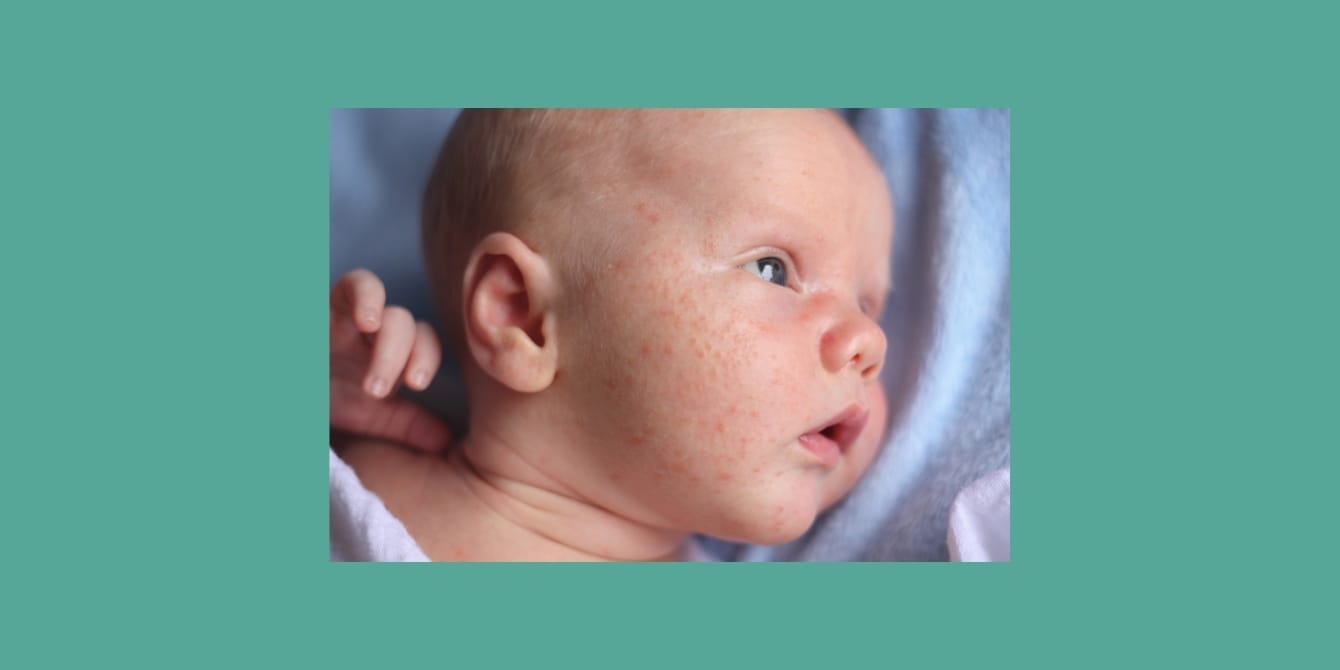Gentle reassurance, mama: You’re not alone if your baby’s skin isn’t “perfect” right now. Baby acne, especially baby acne on the face, is a completely normal (and temporary!) condition that often shows up on the cheeks and forehead. While it might look concerning at first, it rarely requires treatment and almost always clears up on its own.
What causes baby acne?
Wondering what causes baby acne in the first place? It typically stems from your baby’s exposure to maternal hormones—specifically androgens—in the womb. These hormones can stimulate the baby’s oil glands, leading to breakouts a few weeks after birth. This hormonal influence may continue through breastfeeding or even formula feeding, depending on the baby’s unique sensitivity.
Less commonly, baby acne can be triggered by external irritants like certain laundry detergents, rough fabrics, or skincare products that aren’t formulated for newborns. Sometimes it’s just your baby’s developing immune system adjusting to the world.
When does baby acne show up?
Most babies develop acne between 2 and 4 weeks old, though it can occasionally appear earlier or later. Unlike eczema (which is often dry and itchy) or heat rash (which tends to appear in skin folds), baby acne usually shows up as small red or white bumps across the cheeks, forehead, or chin.
Related: Baby skin care questions answered by a pediatric dermatologist: Eczema, acne, & more
When does baby acne go away?
The good news? Baby acne is temporary. Most cases resolve on their own within a few weeks to a few months. So if you’re asking how long does baby acne last, rest assured it usually clears up before your baby hits the three-month mark.
How to get rid of baby acne (gently)
If you’re googling how to get rid of baby acne, here’s your go-to guide for safe, gentle care:
- Wash your baby’s face daily with warm water and a fragrance-free baby cleanser.
- Avoid scrubbing or picking at the bumps (even though we know it’s tempting!).
- Skip the acne creams you’d use for teens or adults—these are way too harsh for baby skin.
- Let it breathe: Avoid heavy lotions, oils, or ointments unless specifically recommended by your pediatrician.
While most baby acne clears on its own, you should reach out to your pediatrician if the breakouts seem especially inflamed, are spreading rapidly, or look infected.
How to help baby acne heal naturally
Looking for more ways on how to help baby acne heal without fuss? Try these gentle, dermatologist-recommended tips:
- Keep baby’s skin clean and dry
- Dress baby in breathable, soft fabrics to reduce irritation
- Avoid letting people touch baby’s face frequently (hard, we know!)
- Use a clean, soft towel to pat dry after washing
- Stick to products labeled “hypoallergenic” and “for sensitive skin”
When to talk to your pediatrician
Sometimes, what looks like baby acne could actually be something else, like eczema, milia, or an allergic reaction. Call your pediatrician if:
- The acne doesn’t improve after a few months
- It looks painful, oozing, or infected
- It’s spreading beyond the face to other parts of the body
Bottom line? Your baby’s skin is going through a lot of changes—and so are you. Baby acne is not a sign of poor hygiene or bad parenting. It’s just one of the many perfectly normal parts of early babyhood. Trust your instincts and lean on your village. This, too, shall pass.
Related: Key ingredients to help your baby’s skin thrive

